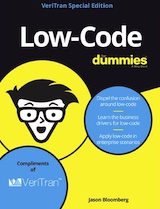
|
FreeComputerBooks.com
Links to Free Computer, Mathematics, Technical Books all over the World
|
|
- Title: Low-Code For Dummies: Creating Applications using Visual Tools and Model-Driven Processes
- Author(s) Jason Bloomberg, Chuck Tomasi, Brad Tilton
- Publisher: John Wiley & Sons, Inc. (2020); eBook (Free VeriTran and ServiceNow Special Edition)
- Permission: Free eBook Complimented by VeriTran and ServiceNow
- Paperback: N/A
- eBook: PDF
- Language: English
- ISBN-10: N/A
- ISBN-13: 978-1-119-65451-3
- Share This:

|
Many organizations have a priority to digitize their processes and move faster to meet changing business requirements, but IT teams are maxed out and need help. The low-code capabilities allow anyone to automate, extend, and build digital workflows that can unlock productivity. Companies can increase app delivery capacity by empowering more people to build applications with less complexity.
Low-code application development describes creating application software using visual tools and model-driven processes – instead of traditional code-based programming. It reduces the amount of hard coding needed, enabling democratized access to development and an accelerated delivery of apps. A low-code platform can range from a simplistic, free software you can use online to a sophisticated, enterprise-grade application development engine that serves the most complex and highly governed processes.
This book helps you understand how to build better applications faster. In this book, there's something here for professional developers, as well as people in any business role.
About the Authors- N/A
 Similar Books:
Similar Books:
-
 Picturing Programs: an Introduction to Computer Programming
Picturing Programs: an Introduction to Computer Programming
This is a textbook for beginning computer programming. It takes a graphics-early approach: you'll start manipulating and combining graphic images from Chapter 1 and writing event-driven GUI programs from Chapter 6, even before seeing arithmetic.
-
 Scratch Programming Playground: Making Cool Games
Scratch Programming Playground: Making Cool Games
Scratch, the colorful drag-and-drop programming language, is used by millions of first-time learners, and in this book, you'll learn to program by making cool games. Get ready to destroy asteroids, shoot hoops, and slice and dice fruit!
-
 Learn to Code with Scratch (The MagPi Team)
Learn to Code with Scratch (The MagPi Team)
Help you get started and guide you step-by-step through the process of creating all sorts of projects: games, animations, quizzes, electronics circuits, and more. You'll find that Scratch isn’t just a great way to learn to code, but lots of fun too!
-
 Code Club Book of Scratch (Rik Cross, et al.)
Code Club Book of Scratch (Rik Cross, et al.)
You'll learn how to code using Scratch, the block-based programming language. You'll find instructions to build cool games, animations, and interactive stories. Your friendly robot guide will aid you step-by-step through each project.
-
 Coding for Kids: Scratch (Stuart Andrews, et al.)
Coding for Kids: Scratch (Stuart Andrews, et al.)
Read it, follow the projects and get to grips with the fundamentals of programming using Scratch, and you and they can learn to code. The projects in this book are fun, so that kids and adults will enjoy making them, and playing them once they are done.
-
 Elements of Programming (Alexander Stepanov, et al)
Elements of Programming (Alexander Stepanov, et al)
The book shows that algorithms implemented in a real programming language, such as C++, can operate in the most general mathematical setting. For example, the fast exponentiation algorithm is defined to work with any associative operation.
-
 A Practical Theory of Programming (Eric C.R. Hehner)
A Practical Theory of Programming (Eric C.R. Hehner)
This book explores aspects of programming that are amenable to mathematical proof. The author describes a programming theory which is much simpler and more comprehensive than the current theories to date.
-
 The Black Art of Programming (Mark McIlroy)
The Black Art of Programming (Mark McIlroy)
This book is an introduction to computer programming. It covers the essential information of a Computer Science course. It is recommended for beginners and intermediate programmers.





